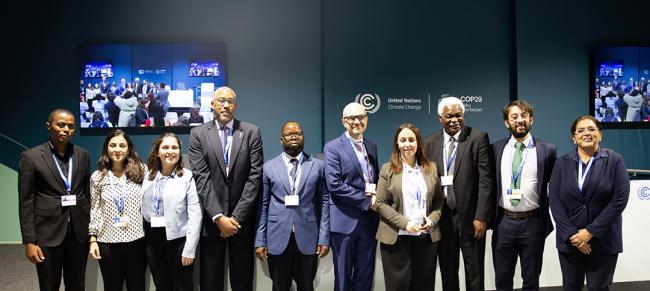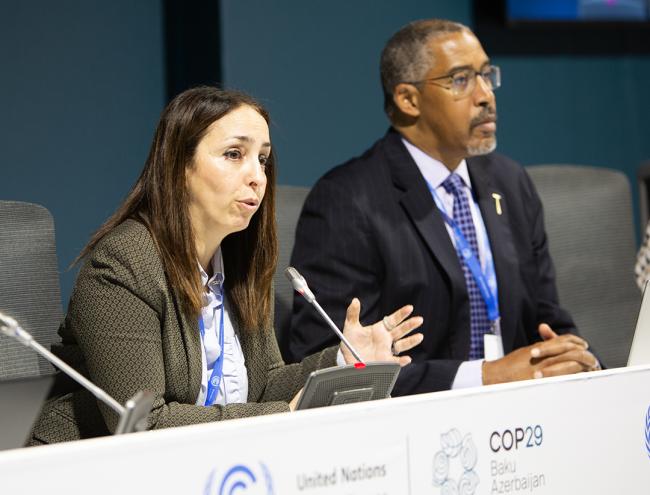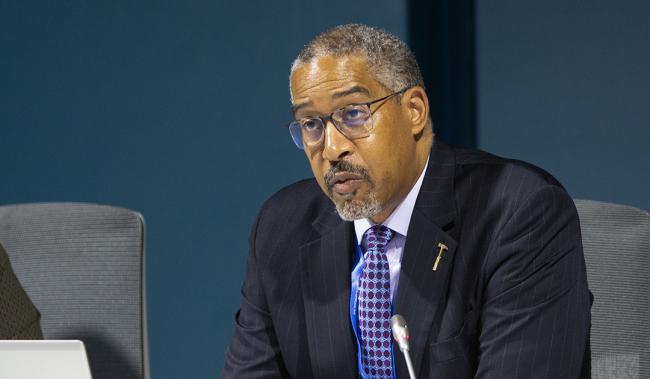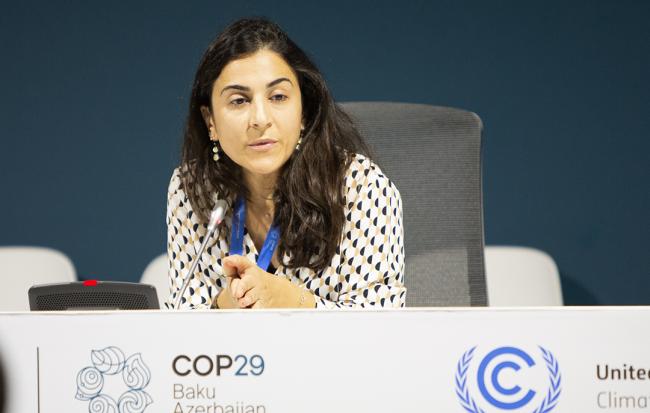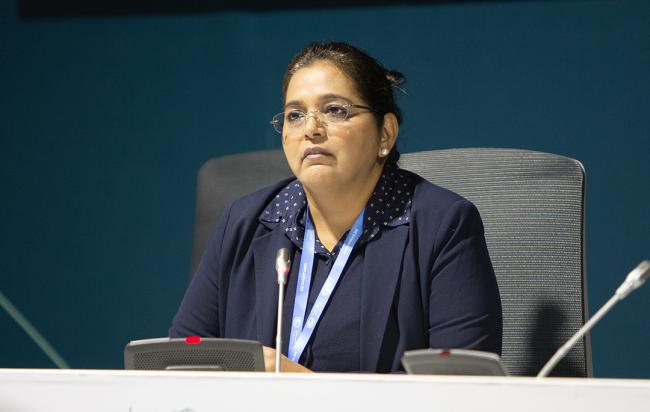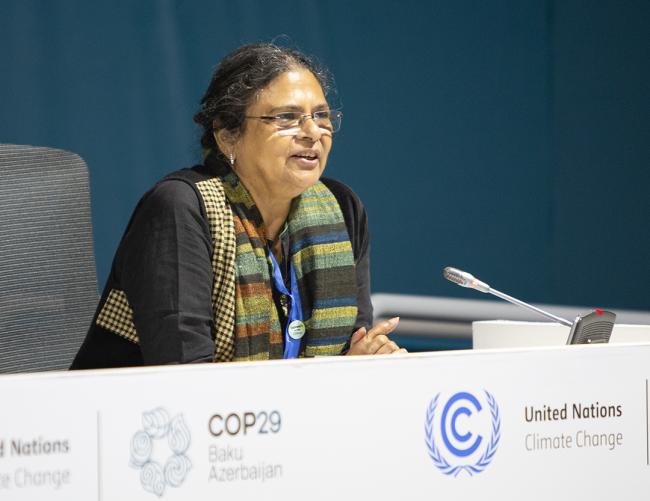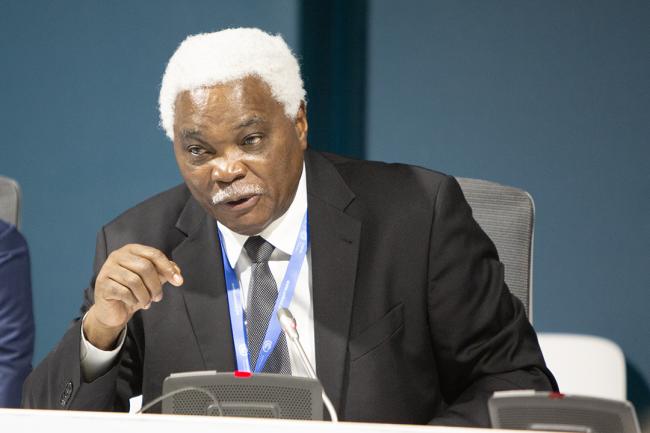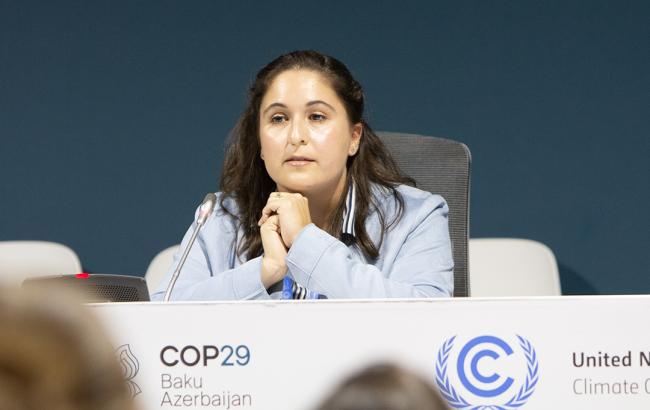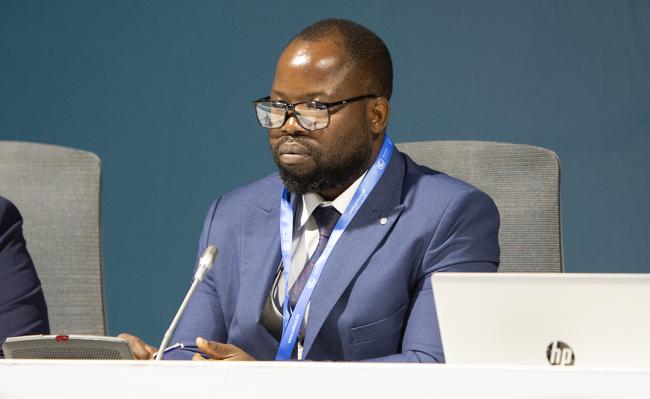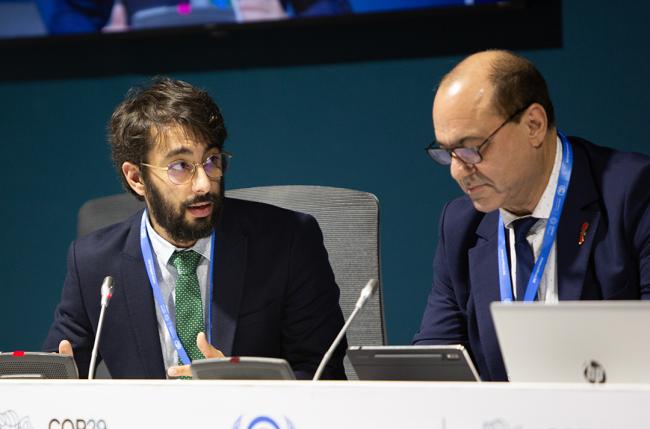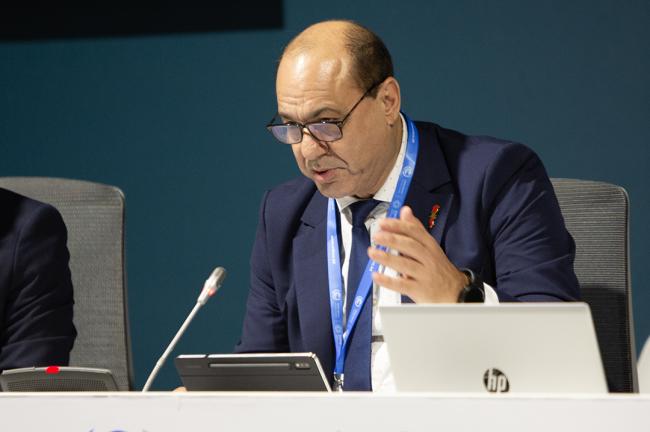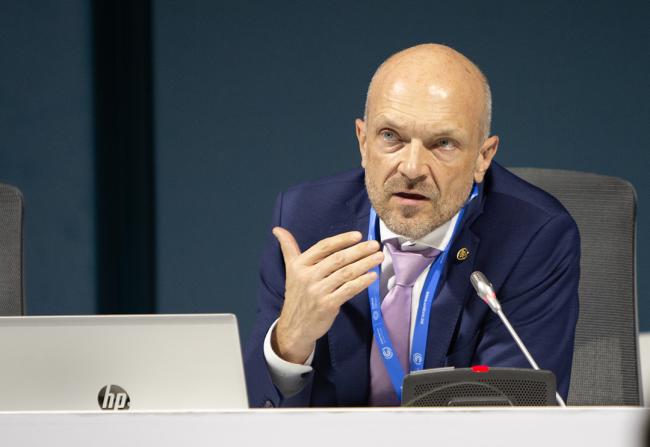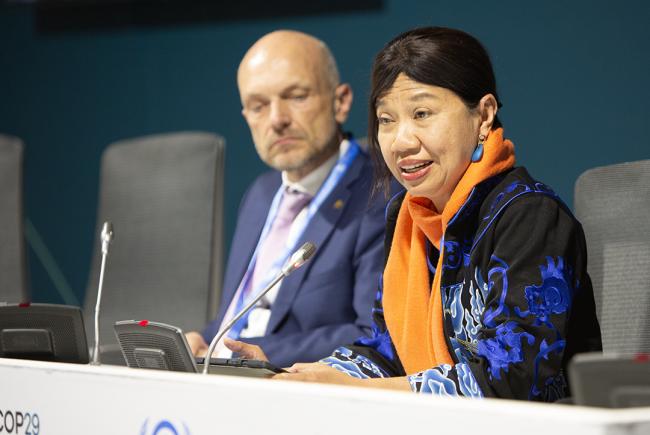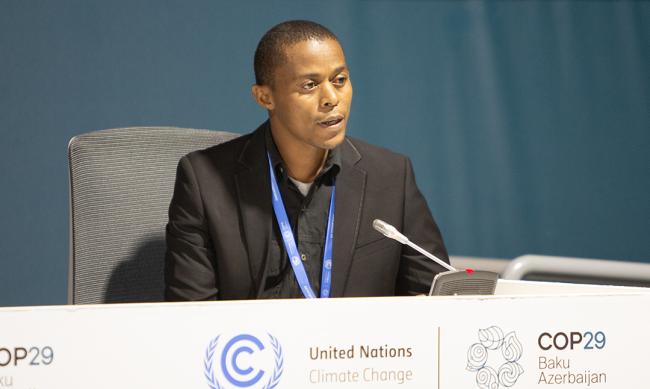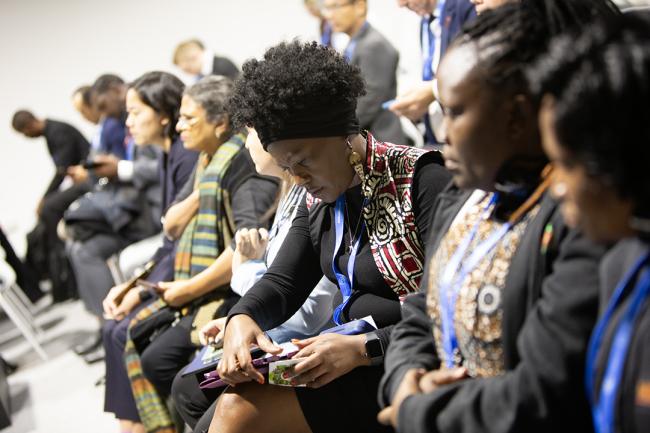About
Exceptionally vulnerable to climate change, informal settlements also face pressures from population growth. This event raised awareness of the intersection between informality, climate displacement, and loss and damage, underscoring the need to learn from local communities themselves.
With climate change exacerbating vulnerability of informal settlements, calls for innovative solutions for enhancing resilience in these settlements are growing. This side event, co-organized by United Cities and Local Governments (UCLG) and Habitat for Humanity International, sought to link discussions on informality to the loss and damage framework. Panelists raised awareness of the intersection between informality, climate displacement, and loss and damage, and underscored the need to learn from local communities themselves when devising partnerships to address the specific vulnerabilities of informal settlements.
In opening remarks, Firdaous Oussidhoum, Assistant Secretary General, UCLG, called for advancing the loss and damage agenda for informal settlements as a matter of urgency and universal justice, pointing to the recent flooding in Valencia, Spain, as an example of the worsening effects of climate change. She highlighted the rising demographic pressures of urbanization and emphasized the importance of strategic urban planning and seizing opportunities within informal settlements to mitigate future risks and foster resilient, equitable local governance. This rationale, she explained, is what inspired the Global Taskforce of Local and Regional Governments to issue a Call to Deliver Efficient Loss and Damage Reponses at the Local and Regional Level at COP 29.
Roland Pearson, Vice-President and Executive Director, Terwilliger Center for Innovation in Shelter, Habitat for Humanity, warned that where the impacts of climate change hit hardest, resources are often the scarcest. He highlighted Habitat for Humanity’s commitment to building safe, resilient homes and emphasized the growing challenge of climate-induced migration, with displaced individuals often forced into ill-equipped urban settlements that lack basic infrastructure. Pearson underscored that, at COP 29, Habitat for Humanity is pushing for housing’s inclusion in climate responses by emphasizing: integrating housing and informal settlements in Nationally Determined Contributions (NDCs); prioritizing adaptation for the most vulnerable; and ensuring housing affordability while advancing mitigation efforts.
Jamila El Mir, Senior Advisor to UN Climate Change High-Level Champion for COP 28, Razan Al Mubarak, emphasized the need to integrate informality into the global action agenda. She stressed the pivotal role of High-Level Champions, which were established to link policies to the “real economy.” Despite progress, she said, gaps remain, particularly in addressing informal settlements, which affect over 1 billion people globally. She called for political visibility and coalitions to amplify the voice of informality, emphasizing the need for new financial flows and innovative approaches beyond traditional mechanisms.
Puja Sawhney, Habitat for Humanity, moderated the first panel on unpacking losses and damages in informal settlements.
Sheela Patel, Director, Society for the Promotion of Area Resource Centres (SPARC), highlighted three critical issues: generational neglect of informal settlements by existing “institutional arrangements”; the compounding impact of climate change on homes, which is the only survival asset in these settlements; and lack of accessible development or climate finance for the poor. She pointed to the Roof Over Our Heads campaign, which seeks to deliver resilient, low-carbon, and affordable homes to those living in informality.
Jean Pierre Elong Mbassi, Secretary General, UCLG Africa, emphasized informality is central to local policymaking in African cities. Stressing the human impact of loss and damage, he called for mechanisms that prioritize local leadership and immediate disaster relief. He pointed to a joint campaign with Slum Dwellers International called Know Your City, which promotes joint information collection to produce change in cities.
Monica Schroeder, Build Change, emphasized a vision where every home can be disaster-resilient, highlighting the need to upgrade existing housing. She discussed the need to address barriers in policy, financing, and technology, showcasing Colombia's resilience framework for informal housing as a replicable model. She advocated for resilient housing to become its own Sustainable Development Goal in the post-2030 agenda.
Peter Lackson Chimangeni, Department of Disaster Management Affairs, Malawi, emphasized the need for a whole-of-society approach to tackling loss and damage, particularly in informal settlements. He highlighted the risks faced by vulnerable communities, where minimal incomes force residents into hazardous living conditions. Stressing improved income generation as key, he also called for better coordination to avoid duplicating efforts.
Pablo Mariani, UCLG, moderated the second panel on loss and damage responses at the local, regional, and global levels.
Mohamed Sefiani, Mayor of Chefchaouen, Morocco, and President of UCLG’s World Forum of Intermediary Cities, highlighted intermediary cities as the next frontier, where half the world’s population will reside, particularly in the Global South. He emphasized addressing informal settlements, ensuring basic services, fostering rural-urban integration, and adopting strategic resilience planning. Sharing Chefchaouen's initiatives, including multi-level governance programmes and climate resilience projects, he invited participants to the 2025 World Forum of Intermediary Cities.
Bernhard Barth, UN-Habitat, emphasized the importance of integrating urban needs into National Adaptation Plans (NAPs) and NDCs, aligning with UN-Habitat's focus on climate justice and just transition. Highlighting a 2024 analysis showing only 27% of NDCs include strong urban content, he urged greater focus on loss and damage in the NDC 3.0 framework.
Bernadia Tjandradewi, Secretary General of UCLG Asia-Pacific (UCLG ASPAC), highlighted Asia-Pacific’s vulnerability to climate change impacts, including annual typhoons and extreme heat. She called for strengthening institutional capacity, improving accessible finance, enhancing technical knowledge with grassroots data, and addressing governance gaps to empower local governments in decision-making and resilience-building processes.
Chrispin Chavula, Habitat for Humanity, highlighted a global advocacy campaign promoting adequate housing in informal settlements across 45 countries, including Malawi. He detailed Malawi's efforts to address loss and damage, housing, and climate resilience, noting progress with a new disaster risk management law.
In closing remarks, El Mir emphasized the need to translate grassroots data into formal policy and to redesign financial flows to ensure accessible, equitable capital. Pearson appreciated the panels’ focus on local communities, stressing the importance of a human-centered design approach that prioritizes practical solutions informed by what communities identify as effective. Oussidhoum highlighted the potential of grassroots involvement and the “invisible billion” as key resources for reshaping municipal and global policy-making processes, including within frameworks such as the Intergovernmental Panel on Climate Change (IPCC). Barth underscored the invisibility of informal settlements in data and research, noting the IPCC’s recognition of this gap.
Organizers: UCLG and Habitat for Humanity International
Contact: Jean-Baptiste Buffet I jb.buffet@uclg.org
Website: https://www.uclg.org
To receive free coverage of global environmental events delivered to your inbox, subscribe to the ENB Update newsletter.
All ENB photos are free to use with attribution. For 2024 UN Climate Change Conference Baku - Side Events , please use: Photo by IISD/ENB | Angeles Estrada Vigil

